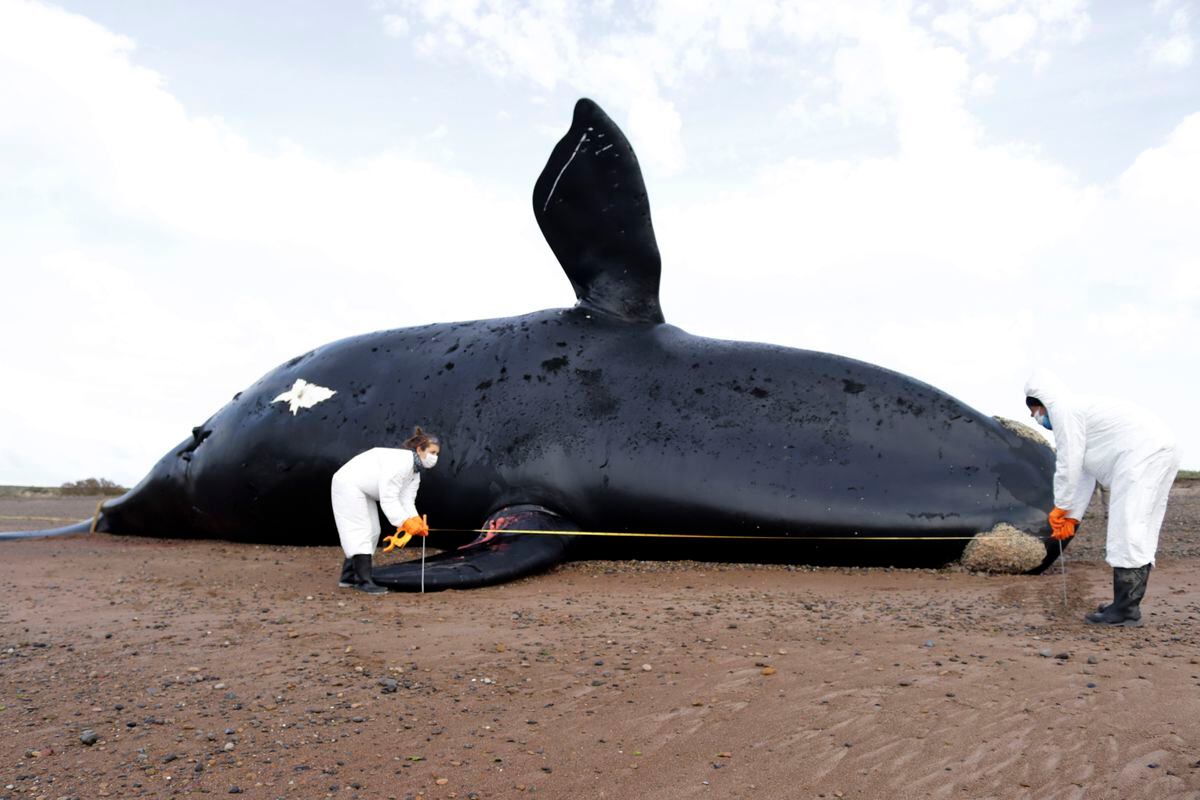Two researchers work on the carcass of a southern right whale off the coast of Península Valdés, in Argentina, in early October. PMSBFA - ICB (PMSBFA - ICB / EFE)
After almost a month on alert, scientists have detected the causes of an unusually high number of whale deaths off the Argentine coast.
The red tide, as the bloom of toxic algae is called, killed some 30 cetaceans in the surroundings of the Valdés Peninsula, a gulf that encompasses six natural areas in southern Argentina where the southern right whale reproduces and gives birth during the southern spring.
The appearance of the corpses on the coast of the province of Chubut since the end of September worried the scientists, who had found corpses without injuries and in good nutritional condition.
1,400 kilometers from Buenos Aires, the Valdés Peninsula is one of the most famous whale-watching areas in the world.
A third of the world population of the southern right whale – which is estimated at around 6,000 specimens – comes every year between April and December to its protected bays, where the calm of the water is ideal for them to mate.
The thirty bodies that scientists found in the last month was not a particularly high number for such a crowded area, but it alerted them to the short space of time in which the deaths occurred: between September 24 and October 11 The remains of 26 adult and four young cetaceans were found, according to the report by the Whale Conservation Institute (ICB).
It was a hard blow.
Just a month ago, the ICB had registered 1.
The ICB report states that the toxic algae especially affected the females, who need more food during the gestation period.
Among the 30 bodies recovered, the scientists found 19 females, three males and eight specimens that could not be identified due to their state of decomposition.
Solved the mystery, the ICB insists that it must not lower its guard.
"Whales have become sentinels of the health of the sea, since they can give early warning signs of changes in the ocean ecosystem," says their report, signed by Marcela Uhart and Mariano Sironi, directors of the Right Whale Health Monitoring Program. Southern.
"The magnitude of the mortality of adult and juvenile whales this year had not been recorded before in the population of Península Valdés, and it was a worrying event for the entire community."
The southern right whale, protected in Argentina as a National Natural Monument, is a species that has managed to recover from extinction after a century of commercial hunting.
An adult whale can measure up to 16 meters, and its curious nature that brings it closer to the surface means that its sighting is not uncommon on the Argentine coast during this time.
Inhabitant of the southern seas, its sighting is also common in Chile, Uruguay, South Africa, Australia, New Zealand.
Despite having avoided extinction, the southern right whale is still a vulnerable species: its gestation period lasts almost three years and, although hunting is prohibited, plastic garbage, maritime traffic and the effect of global warming on crustaceans that serve as food are a permanent threat.
subscribe here
to the
newsletter
of EL PAÍS América and receive all the key information on current affairs in the region

